Investing in female entrepreneurs and dairy farming
The Panjor Bhanga village women’s milk cooperative in Bangladesh
“Generally, the village women are very shy, that’s why it is very difficult to bring them all together”, explains Renu Bala “at first they thought we were trafficking women.”
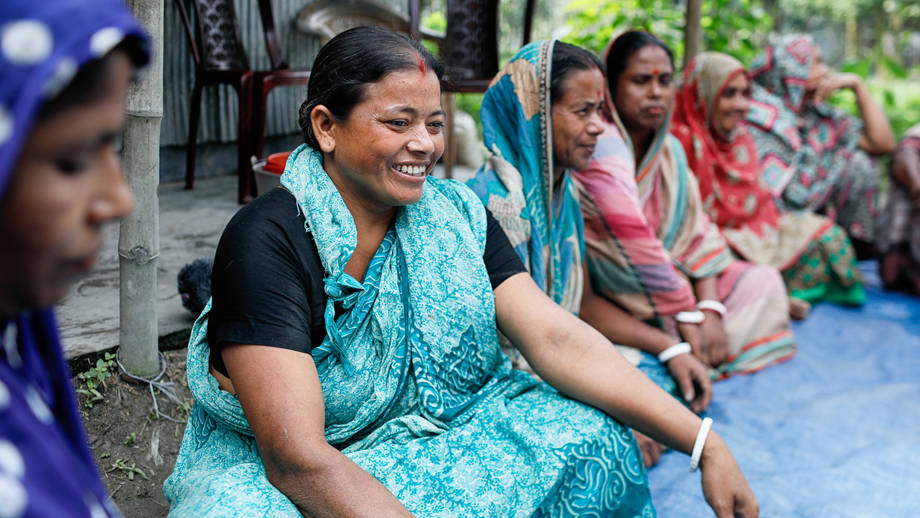
Renu Bala, discussing milk production with other women from the Panior Bhanga village women’s milk cooperative.
Rangpur District, Bangladesh, October 27, 2017.
Renu Bala went from house to house to explain her business idea to the women in Panjor Bhanga village. Most of the women, and their husbands, were sceptical at first.
“I told them if they join this group, they will get different sorts of training, and they will be able to learn many things”.
Renu Bala persevered, and in 2011 fifteen women joined the Panjor Bhanga Mahila Dugdha Samabay Samity (or the Panjor Bhanga village Women Milk Cooperative Association).
“The women of this village are very poor and we were rearing only local Deshi Cattle” she explains. “I thought that if I can start a dairy business, and if I can encourage other women, if I can make them aware, then we can all profit from such a business”.
Her village Panjor Bhanga is located near Kaunia, in Rangpur District of northern Bangladesh. She and her neighbours face many challenges.
“This is a lowland area and flooding is very common. We always have to face the floods” Renu Bala explains “our farm and the paths are completely drowned by the water. It’s very challenging to farm here.”
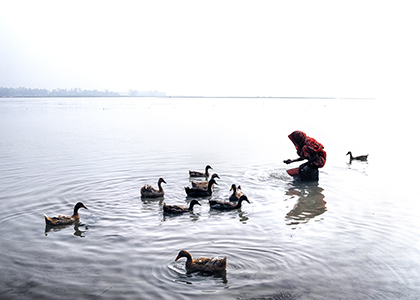
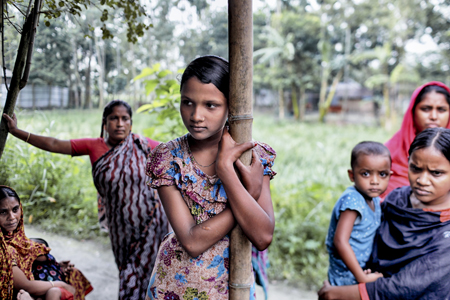
A women from Panjor Bhanga village cleaning pots in, the River Teesta (left), members of the Women’s milk cooperative meeting at Renu Bala’s house (right). Rangpur District, Bangladesh, October 27, 2017.
Another challenge that the women face is access to finance to invest in businesses. For Renu Bala, her dream was to purchase a number of high-yielding dairy cattle. The local breeds only produce a couple of litres of milk per day. However, none of the women have sufficient assets to use as collateral for a bank loan and the complex application processes is an additional barrier.
In 2013, the women received animal husbandry training as part of the Integrated Agricultural Productivity Project (IAPP). This Project, financed by the Global Agriculture and Food Security Program (GAFSP), provided the know-how to rear high milk-producing cows, breed cattle using artificial insemination, and grow nutrient rich fodder crops.
Between 2011 and 2016, Renu Bala was one of over 5,500 farmers, government staff and agricultural technicians who took part in IAPP capacity development programmes led by the Food and Agriculture Organization of the United Nations (FAO). Drawing on FAO expertise in agricultural investment and farmer organization development, the IAPP sought to improve the way in which both the public and private sector invest in rural livelihoods (See “Step by Step: Scaling up Investment”).
Imanun Nabi Khan, a Producer Organization Specialist working at FAO Bangladesh, explains that
“as a result of the IAPP, Renu Bala benefitted from a mentoring programme for rural leaders, farm exchange visits, and she also took part in a ‘study circle’ to better understand public support schemes for farmers”.
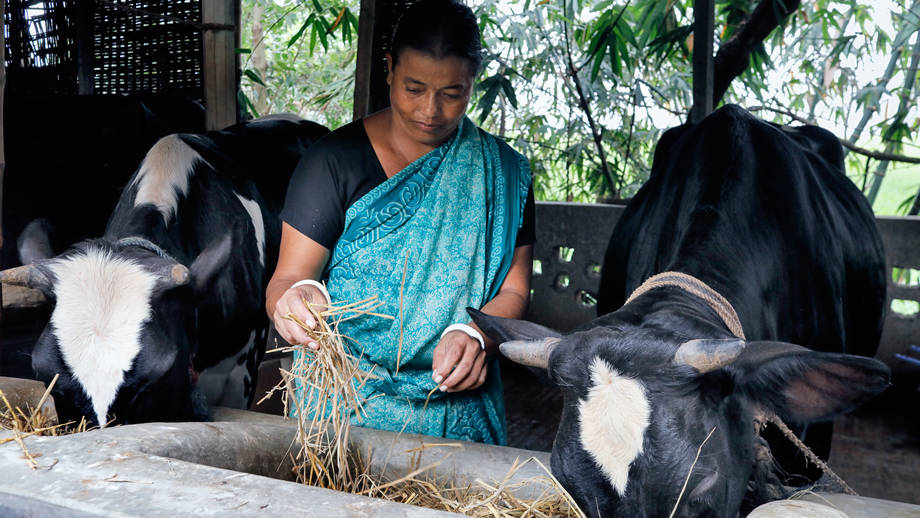
Renu Bala feeding her Friesian cows at her home in Rangpur District, Bangladesh, October 27, 2017.
During the “study circle” Renu Bala heard about the Bangladesh Bank “Rural and Agricultural Credit Policy”. This Policy advocates loans to marginal farmers of USD 2 500 for dairy businesses, with a re-payment grace period of twelve months and a 5% interest rate thereafter. This compares to loans from Non-Governmental Organizations (NGO’s) and microfinance institutions with much higher interest rates, some as high as 27%.
However, after many attempts, Banks remained reluctant to finance the women’s Cooperative. With guidance from FAO, Renu Bala contacted the Mutual Trust Bank.
“The Bank manager came here to visit us one day” she explains, and “he watched the members of this group to see if the women were really interested or not. After that he promised to give us a loan!”
“Finally, we got a bank loan in 2015 after a lot of processing” says Renu Bala.
The Bank considered the Panjor Bhanga Cooperative as collateral, and a loan agreement for USD 13 000 was signed with 15 members of the group. With the one year grace period, the women were able to buy high yielding Friesian dairy cows. From the sale of the heifers, they paid back the loan in full. The state owned Rupali Bank then provided a second loan of USD 10 000 for other members of the Cooperative, which by 2016 had expanded to 30 women.
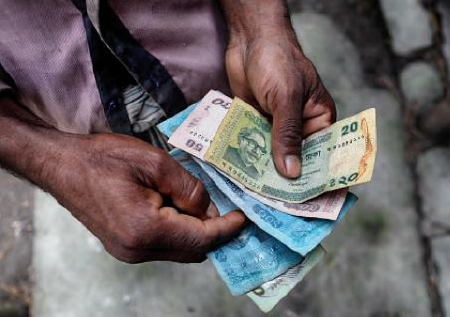
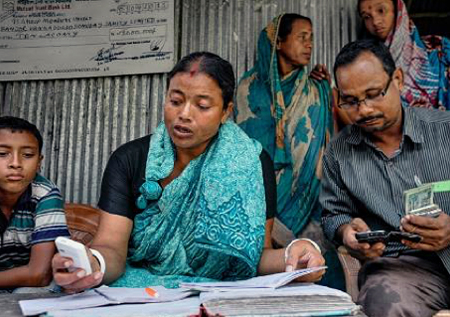
Renu Bala and her husband counting daily receipts from milk sales by the Women’s dairy cooperative.
Rangpur District, Bangladesh, October 27, 2017.
With the improved Friesian breeds and good quality feeds, milk productivity has jumped from 1 to 2 litres to over 10 litres per cow per day. The women also use a lactometer to test milk fat content to ensure they reach the 4% level that garners premium prices. They now collectively sell the milk to local sweet shops and to milk processing companies. On an average day the Cooperative can produce more than 200 litres of milk. The milk sales generate valuable income for the women, and 20% of the revenue is deposited in their Cooperative savings account for future investments.
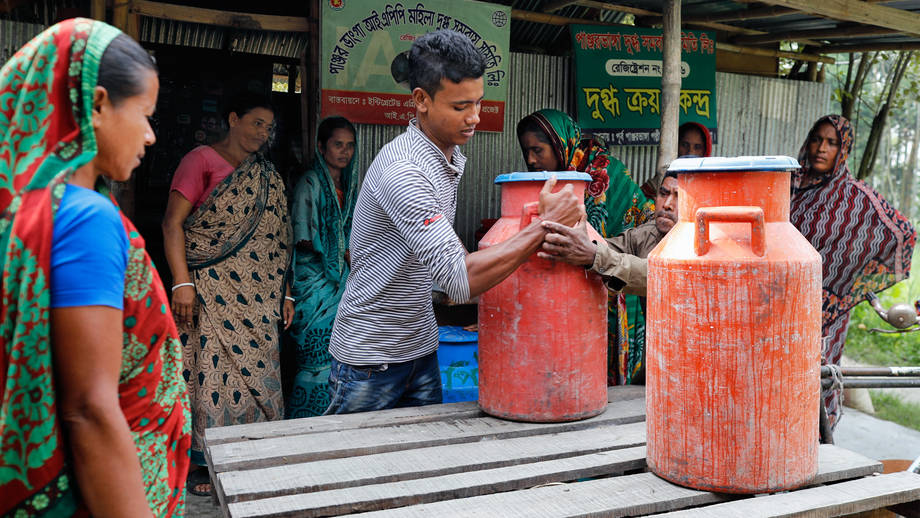
Churns of milk being picked up from Panjor Bhanga dairy cooperative collection point for sale to local milk processing company and sweet shops.
Rangpur District, Bangladesh, October 27, 2017.
“This dairy business is very good for me and other women, because we can do it beside other household chores” explains Renu Bala “that’s why I really like the dairy business. Now we can earn money from home".
The creation of the Panjor Bhanga Cooperative and the bank loan have created an excitement and optimism that is uniting the women. They are now a member of the Sara Bangla Krishak Society (SBKJ) national farmer’s organization, and are actively taking part in their gatherings, training events and new business opportunities (link to Faces of Investment - Abdul Jabbar).
In 2016 Renu Bala received a national agricultural award from the Premier of Bangladesh for her work in establishing and leading the Panjor Bhanga women’s Cooperative. She has also been chosen as a representative for the Missing Middle Initiative (MMI) in Bangladesh, which is being funded by GAFSP. FAO and the Government of Bangladesh will begin implementing the MMI in 2018, which aims to further strengthen around 50 farmer organizations countrywide and to improve their access to financing, innovative technologies, value chains and markets.
Investing in agriculture can transform lives, reduce hunger and malnutrition, and eliminate poverty. Working with international partners, FAO has contributed to over 2,000 agricultural and rural investment strategies, policies and programmes in more than 170 countries. The majority of this work is carried out by the FAO Investment Centre.
